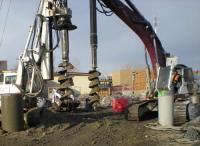Anionic polyacrylamide of AN934 can be used for construction
Soil Stabilization: Anionic polyacrylamide can be used for soil stabilization in construction projects. It helps improve the physical properties of soil, such as its strength and erosion resistance. This is particularly useful in preventing soil erosion and ensuring the stability of construction sites.
Erosion Control: APAM is employed to control erosion on construction sites, especially in areas where there is a risk of soil erosion due to water runoff. By binding soil particles together, it reduces the likelihood of sedimentation and helps in maintaining the integrity of the construction site.
Dust Control: In construction activities that generate dust, such as excavation and earthmoving, anionic polyacrylamide can be used to control dust emissions. It binds fine particles, preventing them from becoming airborne and reducing dust pollution.
Water Clarification: Anionic polyacrylamide is sometimes used for water clarification in construction applications. It can aid in removing suspended solids and impurities from water, ensuring that water used in construction processes is clear and meets quality standards.
Concrete Additive: In some cases, anionic polyacrylamide is added to concrete mixtures to enhance the performance of the concrete. It can improve the workability, strength, and durability of concrete, contributing to the overall quality of construction projects.
Anionic polyacrylamide (APAM) is a type of water-soluble polymer widely used in construction for various purposes. Some common applications of anionic polyacrylamide in the construction industry include:
-
Soil Stabilization: Anionic polyacrylamide can be used for soil stabilization in construction projects. It helps improve the physical properties of soil, such as its strength and erosion resistance. This is particularly useful in preventing soil erosion and ensuring the stability of construction sites.
-

